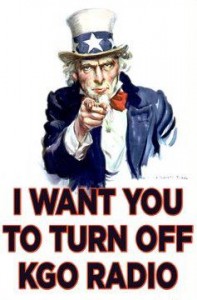 I was expecting a Facebook page to pop up following the dismissal of a small battalion of popular hosts over at San Francisco’s KGO Newstalk 810. But two Facebook pages? Now that’s impressive. The first (or at least the first to come to our attention) is Former Listeners of KGO Radio Newstalk 810. Its info page explains the group’s mission:
I was expecting a Facebook page to pop up following the dismissal of a small battalion of popular hosts over at San Francisco’s KGO Newstalk 810. But two Facebook pages? Now that’s impressive. The first (or at least the first to come to our attention) is Former Listeners of KGO Radio Newstalk 810. Its info page explains the group’s mission:
On December 1, 2011, KGO’s parent company, Cumulus Media, fired most of its on air-talent and other valuable staff without warning. This sends a message that large corporations do not care about progressive and free media in the Bay Area. Let’s band together to send a message to Cumulus and other media monopolies that this is not OK with us.
Former Listeners has a Twitter page, too: Ex KGO Listeners. The second Facebook group has come up with an equally to-the-point title: Occupy KGO. Here’s its statement of purpose:
“Occupy” KGO’s social media, phone lines and mail expressing outrage and disappointment in KGO management’s decision to change the station’s formatting to all-news, most of the time! No tents required. We enjoyed current on-air personalities, but those left are victims of this change as we the listeners walk away. Our primary objective is to drive listenership down significantly and encourage major sponsors to pull-out of KGO. Our ultimate goal is to devastate Cumulus Media, Inc. using these techniques to the point the company needs to re-invent themselves yet again. By doing this, we will have proved that Cumulus’ original business decision of re-formatting to all news, most of the time was, in fact, NOT what the majority of listeners wanted.
Occupy KGO also has a Tweet account: @OccupyKGOAM810 and a live chat room (which seems to work best in Google Chrome).
Ex KGO Listeners is focusing on a market walkout; Occupy KGO, on the other hand, is taking the hands-on approach. Here’s how its “phase 1” event, held on Monday, played out:
Let KGO and its parent company Cumulus Media, Inc. know that you will not tolerate its blindsided changes, taking away the Bay Area’s open news talk forum and replacing it with over-saturated, regurgitated news.
We invite you to express your frustration in a respectful way and encourage you to stand firm with committing to tuning out of the news during times talent took the stage.
During this two-day phase, please chose one number to call each day. Both numbers are listed below. After your call, please post on our page who you talked to, how it went and the response you got.
**As a result of good discussion in the page forum, it should be noted that you should express your disappointment in a firm, but respectful manner! We’re not here to hurt others, just express ourselves.
**
Cumulus Media, Inc: 404-949-0700
KGO Listener Line: 415-216-1050
If you experience any trouble with these numbers, please post any corrections you encounter.
Good luck occupiers!
While you are wondering what “phase 2” will look like, Twitter users are creating a variety of accounts as shout-outs to their lost talk radio heroes. Among the most creative, the Where Did Ray Taliaferro Go page. Last tweet: “We lost Ray Taliaferro, John Rothman, KGO as well. Those SOBs never cease being EVIL. http://t.co/FlhNVsSB.”
Second to last: “The only thing left at the KGO online profile for Ray Taliaferro is a Porsche ad.”
Meanwhile, the San Francisco Chronicle has a insightful op-ed piece about the format change, written by long time talk radio host and author Peter Laufer.
“The surprise silencing of KGO’s talk shows may make budget sense for the radio station’s absentee owners, but pulling the plug is bad news for civic discourse,” Laufer writes.
The demise of most KGO talk shows is not the end of the world as we know it. But it is another incremental step in our alienation from one another, and an important one. Don’t believe the argument that the Internet allows for so much interaction that radio is inconsequential. We choose about what and with whom we interact online; online we exist in special-interest neighborhoods. Nothing wrong with that.
But local talk radio – especially when we’re faced with long commutes alone – helps create and define us. Ratings spike when there is a crisis. We want to be in touch with each other, guided by a familiar – if flawed – “host” such as the local celebrities fired last week as if they were of no special value to the community KGO is licensed to serve.
“A viable community needs a common curriculum of knowledge, otherwise we cannot share the joys and concerns of our neighbors,” Laufer’s commentary concludes. “If we’re isolated from one another, we’re much less likely to care about each other and to work together for common goals.”
Clearly that “viable community” is so important to KGO listeners that they’ve turned to Facebook—and each other—in a bid to bring it back. Good luck to them.


